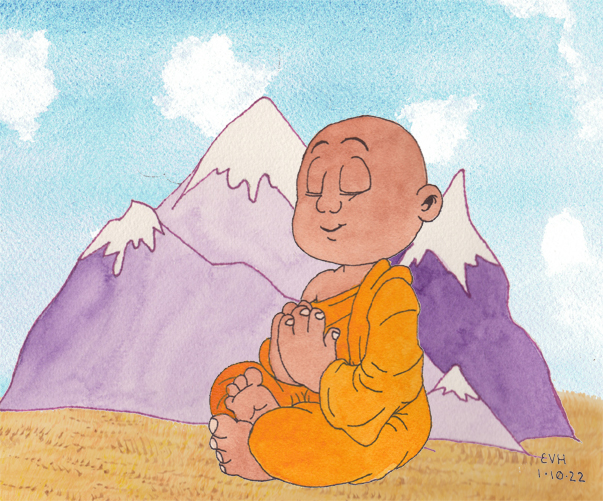
Jataka 293
Kāya Vicchinda Jātaka
Aversion to the Body
as told by Eric Van Horn
originally translated by William Henry Denham Rouse, Cambridge University
originally edited by Professor Edward Byles Cowell, Cambridge University
This is a simple but lovely story about a sick man who vows to undertake the holy life if he finds good health. He is able to do that, and in his new life he finds great bliss and happiness. This is one of the fundamental teachings of the Buddha, that in the simplicity of a monks’ life there is a greater happiness than can ever be found in the conventional world.
“Down smitten with a terrible illness.” The Master told this story at Jetavana. It is about a certain man. We learn that there was a man who lived at Sāvatthi who was tormented by jaundice. The doctors gave up on him as being a hopeless case. His wife and son wondered who could be found to cure him. The man thought, “If I can only get rid of this disease, I will take up the holy life.” Now it happened that a few days later he took some medicine that did him good, and he got well. Then he went to Jetavana and asked for admission into the Saṇgha. He received the lower and higher ordinations from the Master, and before long he became a fully awakened arahant. One day after this the monks were talking together in the Dharma Hall. “Friend, this brother had jaundice, and he vowed that if he got well he would embrace the holy life. He did so, and now he has become an arahant.” The Master came in and asked what they were discussing while sitting there together. They told him. Then he said, “Brothers, this is not the only man who has done this. Long ago wise men, recovering from sickness, embraced the holy life, and it was to their advantage.” And he told them this story from the past.
Once upon a time, when Brahmadatta was the King of Benares, the Bodhisatta was born into a Brahmin family. He grew up and began to accumulate wealth. But then he became sick with jaundice. Even the physicians could do nothing for him, and his wife and family were in despair. He resolved that if he ever got well, he would embrace the holy life. Finally he took some medicine and that did him good. He did get well, after which he went away to Himalaya Mountains and became a spiritual seeker. He cultivated the Five Faculties (1) faith/confidence, 2) energy, 3) mindfulness, 4) concentration/samadhi and 5) wisdom/insight) and the Attainments (jhānas), and he lived in blissful happiness. “All this time,” he thought, “I have been without this great happiness!” and he breathed out this aspiration:
“Down smitten with a dreadful illness, I
In utter torment and affliction lie,
My body quickly withers, like a flower
Laid in the sun upon the dust to dry.
“The noble seems ignoble, and pure the impure seems,
He that is blind, all beautiful a sink of foulness deems.
“Shame on that sickly body, shame, I say,
Loathsome, impure, and full of foul decay!
When fools are indolent, they fail to win
New birth in heaven, and wander from the way.”

Figure: This great happiness
Thus did the Great Being describe in various ways the nature of impurity and constant disease, and being disgusted with the body and all its parts, cultivated all his life the four excellent conditions of life (presumably the brahma viharas: lovingkindness, compassion, empathetic joy, and equanimity) until he was reborn in Brahma’s world.
When the Master had ended this discourse, he taught the Four Noble Truths after which many people became stream-enterers. Then he identified the birth: “At that time I was the spiritual seeker.”
